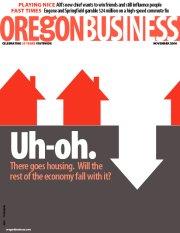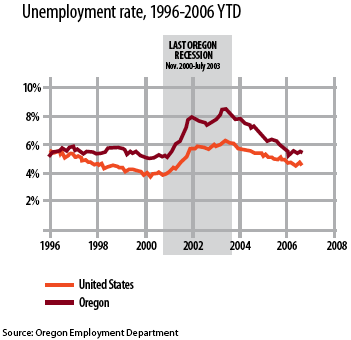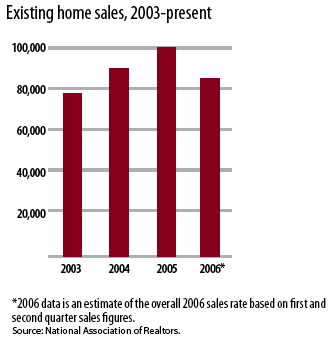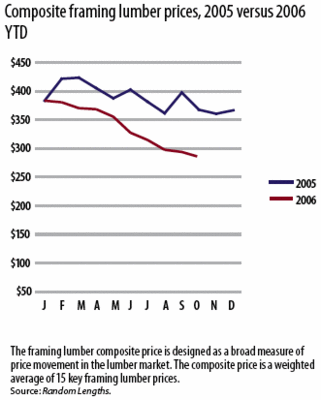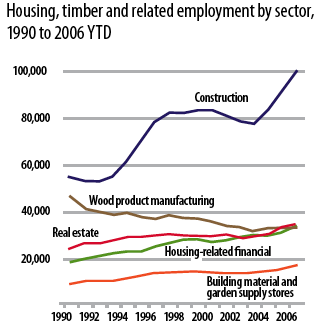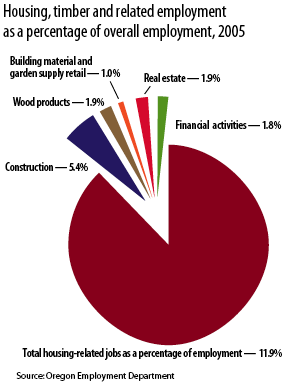The rumors seemed plausible enough at first. This past summer, the housing market was stalling, and in some of the state’s building hot spots — Bend, Medford, the Coast — the gossip was spreading about the industry’s dive.
 Slump? Or just a bump in the road?
Slump? Or just a bump in the road?
The housing downturn has sparked recession fears. Where is the economy really headed?
By Oakley Brooks
The rumors seemed plausible enough at first. This past summer, the housing market was stalling, and in some of the state’s building hot spots — Bend, Medford, the Coast — the gossip was spreading about the industry’s dive. The grapevine said some companies were laying off workers, and others hadn’t pulled any permits for more than a month. Dennis Murphy, president of Hayden Homes in Bend, believed most of what he heard. In sub-divisions around town, he could see that crews were pouring foundations at a slower pace. Then the rumor mill said his company was laying off 60 people at his Portland-area office.
But Hayden doesn’t have a Portland office, and since the company only has 65 people total, that layoff would have amounted to a virtual shutdown. “That’s when I thought, ‘There’s something wrong here,’” says Murphy. Maybe the industry wasn’t in an all-out tailspin after all.
Home sales indeed are declining, construction is slowing and timber prices and production are slipping downward. And the news on those industries and corresponding speculation about where the economy is headed have built to a fevered pitch. Local TV reports are full of housing bubble chatter. What’s more, commentators in the blogosphere and in newspapers such as The New York Times have taken pains to link the softness in the housing market to an imminent recession.
And that kind of doomsday talk is rubbing off on Oregon business leaders: In this month’s Input survey, they say they feel uneasier about the economy than they did last year.
Economists have been anticipating the slowdown of the robust housing market and mulling over what it might mean for the economy for several years. Still, it’s educated guesswork to predict if, and when, the downturn will kick the state and the nation into recession. “We often don’t know we’ve been in a recession until after it has happened,” says John Mitchell, a longtime Northwest economic sage who forecasts for U.S. Bank.
Further complicating matters is the relationship between Oregon’s economy and the nation’s, as well as the world’s. They’re intimately connected but also revolve in their own orbits, and are affected differently by broad economic downturns and upswings.
ECONOMIC SNAPSHOTWhat’s a recession?Econ 101 professors, and much of the popular press, have traditionally defined a recession as two consecutive quarters of negative economic growth. But lately the National Bureau of Economic Research, a committee of economists founded in 1920 that tracks recessions, has come up with a broader definition. According to NBER, “A recession is a significant decline in economic activity spread across the economy, lasting more than a few months, normally visible in real Gross Domestic Product, real income, employment, industrial production, and wholesale-retail sales.” NBER marks the beginning of the last recession in March 2001, and the end in November 2001. However, in Oregon, the recession was more prolonged. In employment terms, it began in November 2000, and didn’t end until July 2003. |
But what many local economists and industry leaders will say is that much of the despair about the housing market and the economy is overwrought. And while there are some important economic weaknesses in Oregon and across the country, the experts are cautiously, if surprisingly, optimistic.
Housing and timber are cooling, but it’s not a disaster.
These two sectors, which are closely related, have hit the brakes after a roaring 2005. Nationally, home prices sank for the first time in 11 years. Residential building permits dropped 21% in August compared to the same month in 2005. In Oregon, the number of existing homes sold fell 12% in the second quarter compared to the same time period in 2005, and building permits took a dive in August, with 2,194 issued versus 2,959 issued the previous August. In places such as Bend, investment dollars that drove up prices and accelerated sales cycles left town. “The investors and speculation that created the 2005 bubble are gone,” says Trish Phillips, principal broker at Bend Style real estate in Bend.
There are smaller signs in Bend of a market slowdown as well. Real estate agents are holding more open houses to entice buyers and speculative builders are cutting back on custom, upscale homes. After building at every possible moment through 2005, they say they’ll return to a typical seasonal slowdown this winter.
But contrary to some rumors on the street, construction has not stopped dead. In fact, residential construction employment was still growing as of September 2006, up about 2,400 jobs statewide over the previous September. In Deschutes County, construction, mining and natural resources jobs (all lumped into one category) grew about 600 jobs in August over the previous year, after growing 1,000 positions between August 2004 and 2005. Jon Chandler, CEO of the Oregon Home Builders Association, says the watchword in his industry is caution. “There’s going to be a correction — is it going to be 1% or 5%? I don’t know,” Chandler says. “But the message is, don’t bet the ranch on one particular market.”
Rumors about abrupt slowdowns and layoffs in the timber industry have more basis in reality. Cutbacks in national homebuilding are causing a precipitous drop in prices of Oregon wood and employment levels in local wood products companies. In mid-October, the weekly composite price index of framing lumber fell to $280 per thousand board feet, down almost $80 from 2005, according to Eugene industry tracker Random Lengths. The publication has also been reporting steady cutbacks at Oregon mills, including many churning out housing studs, from DR Johnson’s mill in Dillard to Boise’s in Elgin.
The situation is edgy enough that several company executives avoided requests for specifics regarding layoffs. Ray Barbee, vice president of sales and marketing at Roseburg Forest Products, says his company had laid off an entire shift from its Riddle engineered wood products plant but says he didn’t know how many workers it affected. But he acknowledged the current environment is a taste of what’s to come in 2007.
“It’s going to be tough sledding over the next 15 to 18 months,” he says. “People could potentially be laid off or lose their job permanently during this. We don’t like that. It hurts the Oregon economy.”
The question is, how much will this and the housing downturn really hurt the state’s economy in the coming year?
A sustained slowdown into next year in housing and timber would sting, but not cut deeply.
ECONOMIC SNAPSHOTHousing and timber markets
|
Like Barbee, those across the real estate, construction and timber industries are predicting a dip in growth and production in 2007. Jeremy Starr, president of the Oregon Association of Realtors, says he expects home price appreciation growth to be in the 4%-6% range across the state, with sales of homes off their 2005 high but still “strong.” The Western Wood Products Association predicts a 7% decline in production next year in Western states, after a projected 3% decline this year.
Those decelerating industries could mean some job loss — but the effect on the overall employment picture figures to be limited. When construction is combined with real estate and related jobs — mortgage brokers and clerks at Home Depot — the housing industry makes up about 10% of the jobs in Oregon. Economists with the state’s office of economic analysis predict about 1,000 jobs will be lost next year in the construction industry. State economists don’t predict the job growth or loss for other subsectors in housing, but in broad sectors that touch housing market jobs — financial services and retail — jobs are supposed to show a modest gain.
Oregon is less vulnerable to a housing-related slump because compared to other states and regions — California and South Florida, to name two — the conventional wisdom is that Oregon’s housing market is less inflated. That’s not to say there aren’t overpriced regions, but overall Oregon may have less room to fall.
“In terms of relative performance, we’re down the ladder from places like San Diego and South Florida,” says Portland General Electric economist Ham Nguyen, a member of the governor’s council of economic advisers.
Nonetheless, in some areas of Oregon, heavy dependence on wood products employment may make local economies vulnerable to a housing slump. In Douglas County, home to Roseburg Forest Products and many other timber companies, wood products jobs made up 10% of total employment in 2006. (In the state as a whole it is 1.8% of total jobs.) The manufacturing jobs are some of the better family-wage positions offered in the region, and a network of support jobs — truck drivers and machinists — also depend on the timber industry.
Even if the state won’t be thrown into a decline by timber’s woes, the continued slackening of demand for new housing materials may cause pockets of economic distress in places such as Roseburg, Elgin and Tillamook, where timber is still a major player.
The bottom line: It’s not déjà 2002.
“You could call it a growth recession,” says Dae Baek, the acting state economist, predicting what 2007 will look like. “We’re going to be growing but not as fast as before.” Baek notes that manufacturing in the state in areas such as transportation equipment and semiconductors is still going strong and looks like it will continue into the first half of next year.
Bill Conerly, with Conerly Consulting in Lake Oswego, agrees, noting there’s still plenty of opportunity for businesses across the country to make investments in this new equipment to reduce operating costs.
That’s a major positive sign for Oregon, which relies heavily on business spending nationally and internationally to keep up demand for everything from Intel semiconductors to Gunderson rail cars to steel plate from Oregon Steel Mills. In the last recession, a huge drop in business investment after the dot-com crash and 9/11 hit Oregon hard; it made the recession here much more severe than in the rest of the country, stretching it over three years and pushing the state’s unemployment levels above 8% in 2002 and 2003.
ECONOMIC SNAPSHOTThe Oregon economy
|
If a national recession were to hit now, the scenario would probably be different. Nationally, says Conerly, the big risk is that consumers will be scared by uncertainty surrounding their biggest investments — their homes. If the equity on people’s homes stops rising, they’ll have less to borrow new money against and be less inclined to go out and buy snowmobiles and new cars this winter. But because of our business investment-dependent economy, Oregon leans less on that consumer spending than do other parts of the country. “The biggest driver here is business investment,” Conerly says. “If a recession hits, it probably won’t be as bad for us as a place like Michigan, which is heavily dependent on consumer spending.”
Oregon has another positive engine of growth: the immigrants who continue to pour into the state. As PGE’s Nguyen points out, Oregon’s population has grown at roughly double the rate of the rest of the country. All those new people keep the service and retail sector humming with their demand for lattes, new shoes and health care. “People will continue to move in and that’s creating jobs,” says Nguyen.
In some of Oregon’s other sectors, tourism and agriculture are having a good 2006, which bodes well for next year. Also, health care has been growing slowly but steadily each year by about 3,600 jobs, or 2%.
Economists in Oregon also see some positive trends nationally in the steadying of interest rates set by the Federal Reserve and the decline of gas prices.
Still, the clouds over the national economy aren’t good for anyone.
Even if a lot of the signs in Oregon still look good, the overall slowness of growth both here and across the nation has increased the chances that some shock to the economy could push it quickly into negative growth. Conerly puts the chances of a consumer-led recession at one in four.
Mitchell and others have concerns that an energy-price shock also could trigger stagnation, having watched how Hurricane Katrina damaged the Gulf of Mexico oil supply and quickly wreaked havoc on gas prices last fall. Says Nguyen: “We’re only one storm or other interruption short of a crisis in the energy market.”
State economist Baek notes that right now international markets in Asia and Europe are strong and predicting growth. But there are plenty of geopolitical risks that could disturb them, such as terrorism or avian flu.
In Oregon, widespread concerns in finding quality workers may begin to have a systemic effect on the economy. “It may be one of the reasons we see slower growth, because it’s harder for companies to hire,” Conerly says. “There’s a class of people for whom just showing up on time is hard.” As more and more baby boomers retire, this problem will only be exacerbated.
And there are the outside chances that business investment won’t hold up in the next year, or inflation — which so far looks in check — will creep back into the picture.
Mitchell allows that these and some other pitfalls outlined by him and other local economists could indeed undo the economy.
“I could see us sitting here in a year and looking back and saying, ‘This happened and that happened and, yeah, there was a recession,’” Mitchell says.
Nguyen says the distantly threatening issues like inflation are “only outliers. But sometimes we overlook the outliers.”
What does this mean to the wider Oregon business community? To paraphrase the building association’s Jon Chandler, don’t do anything wildly optimistic. But don’t live in fear, either. The dot-com bubble has passed. We’re in a new era.
Have an opinion? Write [email protected].

